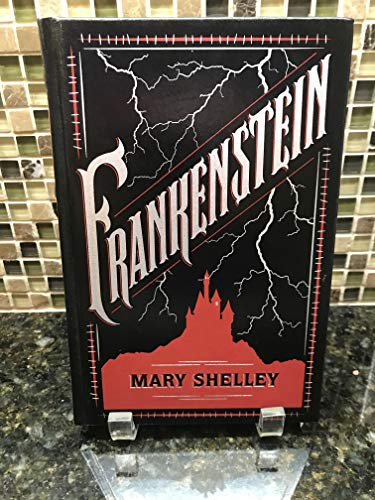Frankenstein: Or the Modern
Prometheus by Mary Wollstonecraft Shelley
After reading Dracula by Bram
Stoker, I thought I should read another story about a classic
literary monster. I started reading Frankenstein on ebook a while ago
and got about 3 chapters in before I gave up. I couldn't keep track
of what was going on in the story. For this read I am doing audio
from the website Lit2Go. There are two versions of the book, one
published in 1818 and a second revised edition in 1831. Lit2Go uses
the original 1818 version. The second edition adds a new introduction
by Shelley and changes a few details of the characters as well as the
structure of the book.
Not knowing what to expect from this
book, I'm surprised to find it more like Dracula than I thought and
in some ways very different. I find Victor Frankenstein to have
similar characteristics to Van Helsing, both strong willed, full of
conviction but conflicted with what they have done or have to do.
The first four chapters of the book set
up Victor's family life, his adopted cousin/sister, and his interest
in the medical sciences. One quote caught my attention; “Fairer
than a garden rose among the dark leaves brambles” (Frankenstein,
Shelley). It reminds me of the saying “fairest of them all” but
put more elegantly and I find it to be romantic.
One thing that I find interesting is
Victor's realization that he could possibly create life. He has
experienced the hardships of death, so it would seem that creating
life is something he would be intrigued by. I like that he is
conflicted with his decision, but ultimately his knowledge and
curiosity win out and he indeed does create life. Another good quote
is “to examine the cause of life, we must first have recourse to
death” (Frankenstein, Shelley). To understand life means to
understand death, and death is some thing that he has experienced in
his young life.
Something that I noticed while Victor
is studying at school, is that the book talks a lot about science,
but nothing is actually explained. A hard contrast to modern works of
science-fiction, where the science is explained, even if it's not
accurate. It is implied in the story that Victor uses electricity to
bring his creature to life, but never outright stated, just him
observing lightning and what drives life. After he brings his
creature to life, Victor is horrified not only by the monster but by
what he has done.
The book then jumps ahead two years and
Victor is notified of his younger brother's death. On his travels to
his hometown of Geneva, Victor sees his creature on the hillside and
is immediately convinced that the monster is to blame for the death
of his brother William. Much of this book early on, is about Victor's
guilt and deals with the philosophical questions of responsibility in
the creation of life. A similar question posed in the movie Jurassic
Park, being that just because you can do something or in Victor's
case, create life, doesn't mean that you should. But the book goes
one step further and asks if scientists can then do they have a
responsibility to follow through? The book doesn't really provide an
answer other than Victor's initial choice of choosing to follow
through. But it's a good question that comes up in real life, about
should the progression of science be limited by our morality.
The emotional journey of Victor gets
more complex after his friend Justine is tried and wrongly convicted
of the murder of his brother. Victor becomes depressed, until he
encounters his own creation. The book then shifts perspective and
tells the creature's story after leaving Victor. This was an approach
to the story that I did not see coming. As some one not familiar with
the story of Frankenstein, I haven't even seen the classic movies, I
wasn't sure how much of the monster we we're going to get in the
book. I like the idea of transitioning from Victor's guilt to showing
the creatures life and his motives. It makes for a sympathetic
character that was almost turned into a villain and asks if Victor
(or people) in general make someone a monster. I like this shift, and
look forward to finishing the rest of the book to see what happens
with Frankenstein's monster.
If you have read the book please leave your comments down below, or tweet @BelleArboreus. Would love to hear your thoughts and interpretations on the book. Stay tuned for my comments on the rest of the book.
Shelley,
M. W. (1818). Frankenstein,
or the Modern Prometheus.
London, England: Lackington, Hughes, Harding, Mavor & Jones.
CW
Arrow/Flash Crossover podcast leading up to Crisis on Infinite Earths





No comments:
Post a Comment